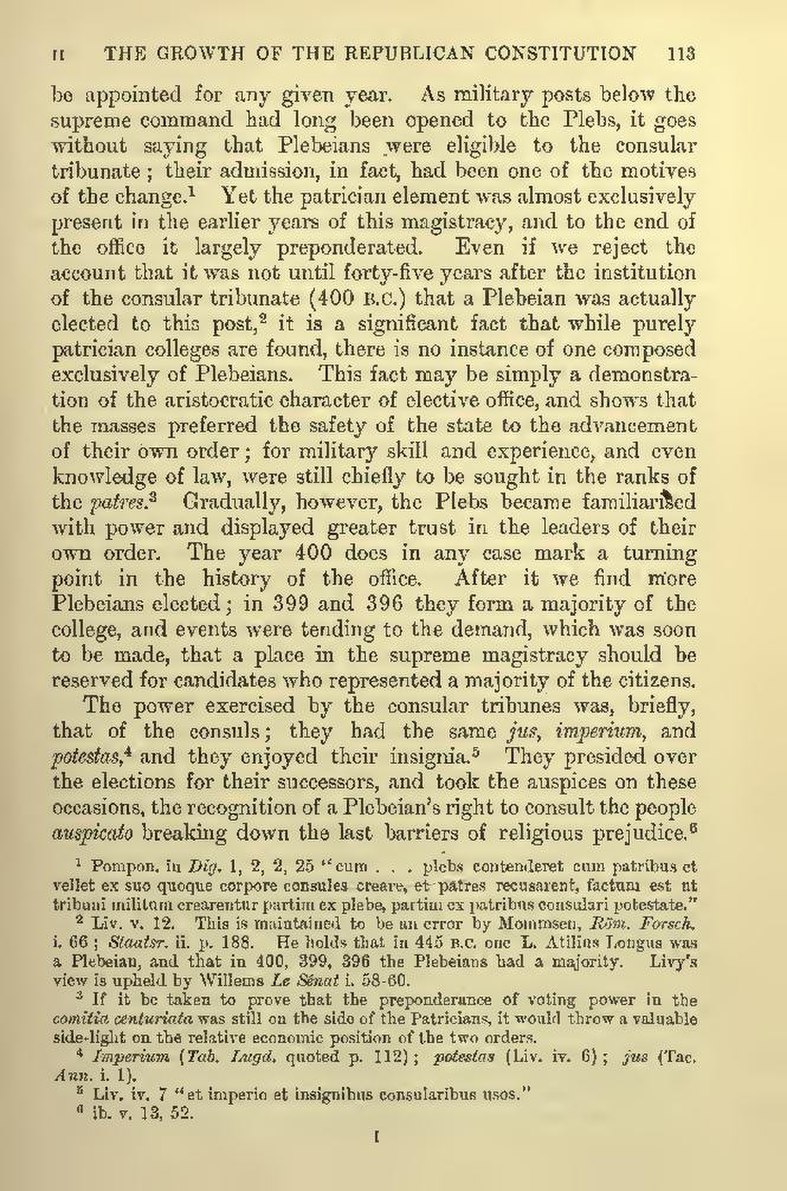be appointed for any given year. As military posts below the supreme command had long been opened to the Plebs, it goes without saying that Plebeians were eligible to the consular tribunate; their admission, in fact, had been one of the motives of the change.[1] Yet the patrician element was almost exclusively present in the earlier years of this magistracy, and to the end of the office it largely preponderated. Even if we reject the account that it was not until forty-five years after the institution of the consular tribunate (400 B.C.) that a Plebeian was actually elected to this post,[2] it is a significant fact that while purely patrician colleges are found, there is no instance of one composed exclusively of Plebeians. This fact may be simply a demonstration of the aristocratic character of elective office, and shows that the masses preferred the safety of the state to the advancement of their own order; for military skill and experience, and even knowledge of law, were still chiefly to be sought in the ranks of the patres.[3] Gradually, however, the Plebs became familiarised with power and displayed greater trust in the leaders of their own order. The year 400 does in any case mark a turning point in the history of the office. After it we find more Plebeians elected; in 399 and 396 they form a majority of the college, and events were tending to the demand, which was soon to be made, that a place in the supreme magistracy should be reserved for candidates who represented a majority of the citizens.
The power exercised by the consular tribunes was, briefly, that of the consuls; they had the same jus, imperium, and potestas,[4] and they enjoyed their insignia.[5] They presided over the elections for their successors, and took the auspices on these occasions, the recognition of a Plebeian's right to consult the people auspicato breaking down the last barriers of religious prejudice.[6]
- ↑ Pompon. in Dig. 1, 2, 2, 25 "cum . . . plebs contenderet cum patribus et vellet ex suo quoque corpora consules creare, et patres recusarent, factum est ut tribuni militum crearentur partim ex plebe, partim ex patribus consulari potestate."
- ↑ Liv. v. 12. This is maintained to be an error by Mommsen, Röm. Forsch. i. 66; Staatsr. ii. p. 188. He holds that in 445 B.C. one L. Atilius Longus was a Plebeian, and that in 400, 399, 396 the Plebeians had a majority. Livy's view is upheld by Willems Le Sénat i. 58-60.
- ↑ If it be taken to prove that the preponderance of voting power in the comitia centuriata was still on the side of the Patricians, it would throw a valuable side-light on the relative economic position of the two orders.
- ↑ Imperium (Tab. Lugd. quoted p. 112); potestas (Liv. iv. 6); jus (Tac. Ann. i. 1).
- ↑ Liv. iv. 7 "et imperio et insignibus consularibus usos."
- ↑ ib. v. 13, 52.
